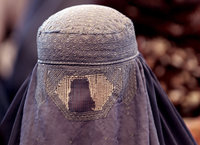Afghanistan 2014 election fraud recalls fraud of August 20, 2009
By Gib McInnis

A month has gone by since the June 13 Afghanistan elections, and still there are no clear answers to the questions about why the electoral fraud happened on the day of the June 13 election, in which the results showed that the former World Bank official Ashraf Ghani had won over Abdullah Abdullah by about a million votes. However, once the election fraud of 2009 is brought back into the limelight, there maybe a clear reason as to why it is happening again.
On July 13, Saleha Sadat, reporting for the Afghanistan news service TOLO News, stated that Former Chairman of the Independent Election Commission, Fazl Ahmad Manawi, said on Sunday that "the auditing process will be conducted in the presence of the UN, European Union, other international observers and representatives of the candidates." In addition, Manawi stated that it still remains "unclear whether or not the same 17 methods used in 2009 will be used in this year's auditing." But at the same time, Manawi reassured the international community that the "International standards of auditing are clear because we've used the procedure in 2009." Furthermore, if the reader will recall, that same "procedure" enticed the Western media to declare that, in the August 2009 Afghan election, Hamid Karzai won 54.6 percent of the vote.
However, those "International standards of auditing" used in the August 20 2009 Afghanistan election were not at all that clear, but instead were eventually found out to be fraudulent by the then deputy head of the UN mission in Afghanistan, Peter Galbraith. Galbraith's investigation discovered that around 1.5 million of the total votes cast were fraudulent; in fact, after his investigation was completed, Galbraith estimated that 1500 polling (of 7000) stations that were on the Afghanistan map could not even be reached by any voter, accept by "military escort or by a camel and a few gallons of precious water."
Initially, Galbraith approached the UN High Commission to submit his finding about the fraudulent voting practices, but his request was ignored. Galbraith then attempted to take his concerns to the Western media, accusing his former boss (UN Special Envoy), Kai Eide, and Ban Ki-Moon of intending to cover up the fraud-riddled presidential elections in favour of President Karzai. Moreover, after much embarrassment and international pressure, the U.S. allowed for further investigations. This Independent Auditing Commission initially focused on 350 ballet boxes, and the Electoral Complaints Commission launch their own investigation. Thirty-percent of the Karzai votes were found fraudulent, lowering his 54.6 percent victory to below the democratically acceptable level. Yet, Karzai was encouraged by the American administration to hold his office anyway.
Likewise, after reporting the results to his commission, Galbraith was first recalled back to New York and eventually fired by then U.N. Secretary General Ban Ki-moon. Months later, in an October 4 2009 Washington Post opt-ed, Galbraith concluded that, "As many as 30 percent of Karzai's votes were fraudulent, and lesser fraud was committed on behalf of other candidates." That 30 percent amounted to over one million and half votes. Galbraith added that "In several provinces, including Kandahar, four to 10 times as many votes were recorded as voters actually cast." These were pretty obvious flaws, yet these results were accepted by democratic governments around the world, and especially by the United States administration.
Galbraith, the son of famous economist John Kenneth Galbraith, was initially appointed after Ban Ki-moon, the UN secretary-general, finally bowed to pressure from the administration of Barack Obama. However, it was Obama who had Galbraith fired after Galbraith uncovered those fraudulent ballet boxes in Afghanistan in the August 2009 election; thus Obama fired Galbraith for washing U.S. dirty linen in public. The Americans tried to save face by declaring to the world that there would be a run-off election, which, after a few months, most people forgot about, and so did the American government. There was no run-off election ever held. Hence, these were the "International standards of auditing" used for the August 20 2009 Afghanistan election.
My contention with the U.S. foreign policy in Afghanistan is that it is founded upon a desire to imitate an image of violence and militarism that we are witnessing on a daily basis around the world, and especially in Iraq at the moment. Likewise, any international support of this type of foreign policy will no doubt cause deep psychological and political defeat. Why is this so? Since the Vietnam War, the U.S. government has not concerned itself primarily with winning or losing wars, or achieving peaceful solutions, because engaging the U.S. public in conflicts can no longer be achieved by patriotic appeal.
Instead, the U.S. engages in these conflicts because it keeps those who work for that military machine employed and well paid. If you consider that America produces about sixty-eight percent of the world's supply of weapons, violence and militarism must be an ongoing pursuit of the American government. If it is not, then millions of Americans will end up on unemployment lines, or worse! Thus, for American progress to "progress", the U.S. government must create an ongoing need for wars. Likewise, we can be certain that if the recount shows that Ashraf Ghani is the American "vote" over Abdullah Abdullah, Abdullah's Mujahedeen supporters will no doubt add to that "need" back in America on those assembly lines of American weapons manufactures.
Gib McInnis
Gib McInnis is the founder of InExile Publications, which has re-published Paul Goodman's Moral Ambiguity of America, with an Introduction by him, a debut work by the American poet Erik Wackernagel's She Bang Slam and Sir Leonard Woolley's Ur of Chaldees. He also published numerous stories as a freelance journalist for the Sherbrooke Record and for the oldest English newspaper in North America, The Quebec Chronicle Telegraph. See his writings on his Amazon's Author Page
Subscribe to Pravda.Ru Telegram channel, Facebook, RSS!




